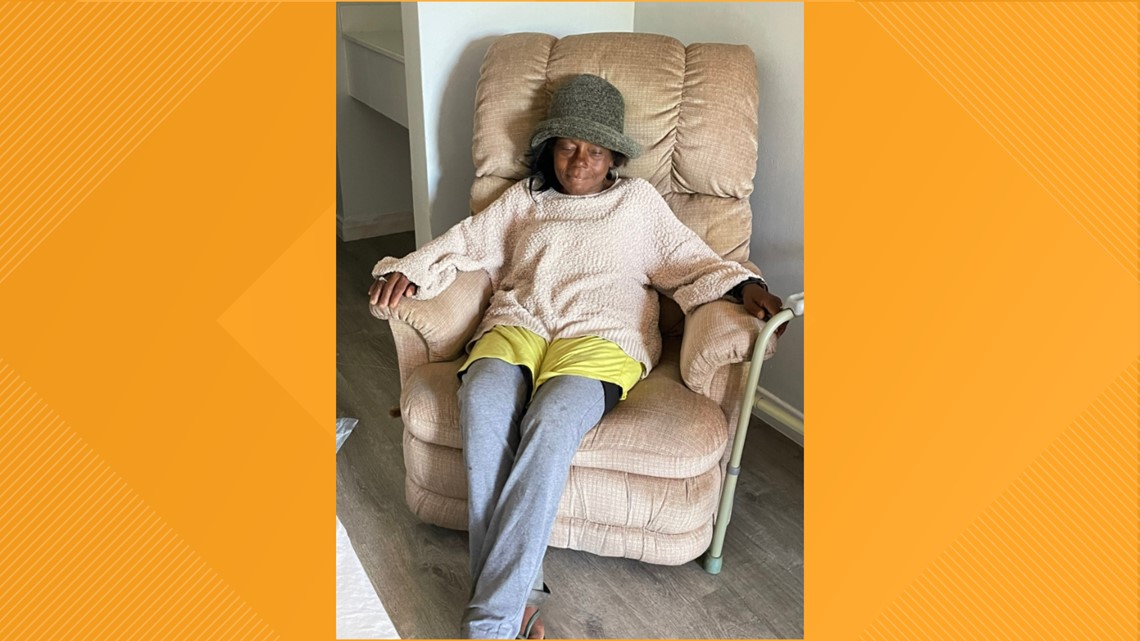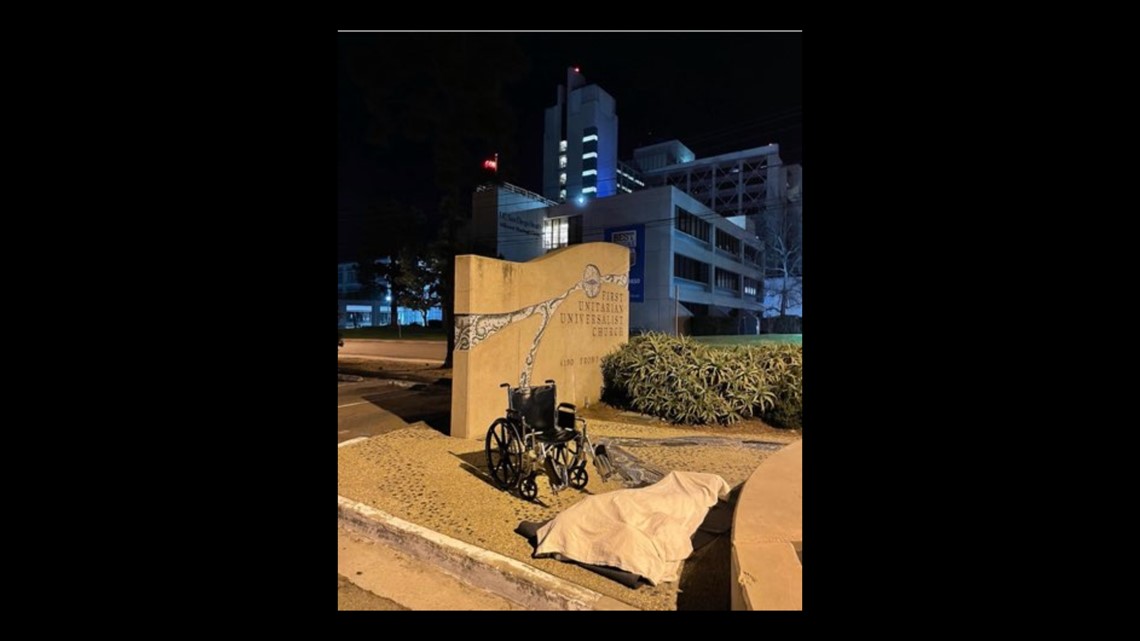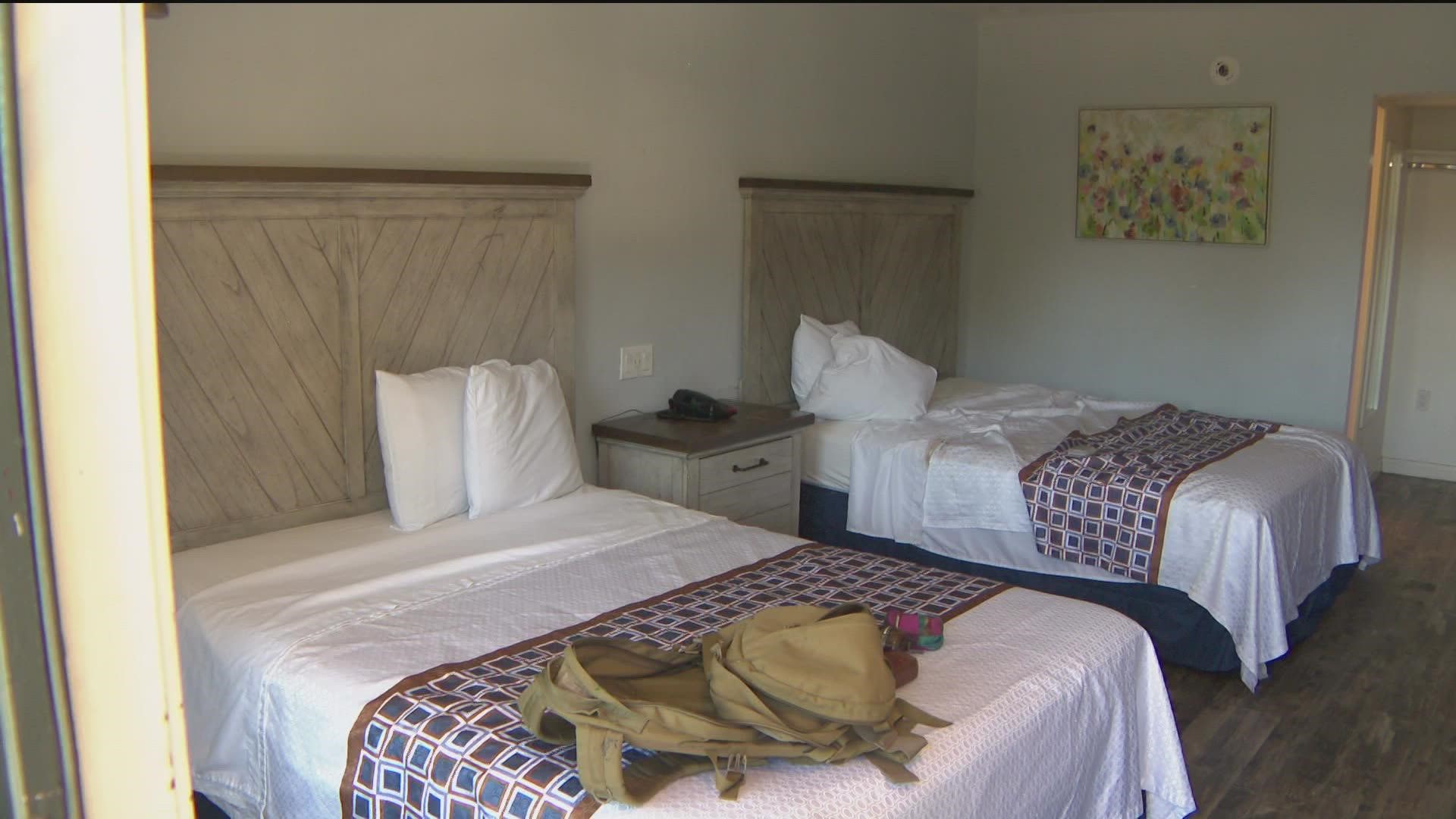SAN DIEGO — Amie Zamudio was driving down 16th Ave in Downtown San Diego's East Village neighborhood just after 7 a.m. on June 21 and saw a handful of police officers outside of a tent on the sidewalk.
Inside, sat 65-year-old Carol.
Zamudio pulled her car and approached the tent. Zamudio said officers were threatening to arrest Carol for refusing their offer to be placed in a shelter.
Zamudio told the officers that it was too early to know if the shelters could accommodate Carol's need for a bottom bunk.
That's when Zamudio offered Carol a hotel room through Housing for the Homeless, a small non-profit that Zamudio co-founded with Joanne Standlee last year.


Providing a bed, meal and access to healthcare
Zamudio and Standlee search city streets for medically compromised elderly people who are experiencing homelessness and place them into hotel rooms that the non-profit leases. Once in, the seniors are taken to medical appointments, are registered in the county's homeless management intake system, and have a warm bed to sleep in and food to eat.
The non-profit also helps get seniors new identification cards, social security cards, and helps them access their medical benefits.
"I think some elected officials think our guests are in these rooms partying," said Zamudio. "In reality, 90% of our time is making medical appointments for them and staying with them during those visits as patient advocates," said Zamudio. "It's a huge gap in the system, especially when we know from the recent county that over 2,000 people over 55 years of age are unhoused."
'I didn't know a way out'
Doug Jack moved here from Palm Springs. The 60-year-old Emmy-Award-winning choreographer, who worked on the 2002 Olympics started living in his car after losing his life savings in a bad business deal.
When his car broke down, he started living out of the trunk of the car.
"I didn't know a way out," said Jack. That's when Zamudio and Standlee found him.
"They got me my EBT, they got me my medical benefits back. I was able to see the doctor, and now my blood pressure is down, I've got the glasses I need and I go to the dentist next week."
More importantly, says Jack, "They got me permanent housing in Talmadge in senior apartments through a federally supported program. I move in on the Fourth of July."
Zamudio said finding elderly unhoused people is not a challenge.


"We find people in encampments, on the streets and sidewalks while we are doing outreach, or outside hospitals in the early morning hours when buses are not running and the shelters are not doing intakes. Other Homeless Service Providers, doctors, and staff also call us," says Zamudio.
Struggles with funding
While finding people in need is not hard, finding funding continues to be a challenge.
The non-profit relies on GoFundMe drives and private donations to pay for the rooms and for the program. For $1500, a month, they pay for one hotel room for a senior.
Challenges aside, the results are impressive.
Zamudio said since the beginning of the year, 18 people have been placed in permanent housing, five people have recovered their housing vouchers, another six have received vouchers, eight people are now in assisted or independent nursing facilities and one has returned to his family.
Joanne Standlee is the executive director of Housing 4 the Homeless and says she can’t look away from people suffering. Her organization has helped seniors as young as 59 to 80 years old.
“We let them just sleep, eat and relax for a couple days, at the same time, we start to help them rebuild their lives from a document point of view since everyone we know has lost their ID or driver’s license, birth certificate, Social Security or EBT card.
Standlee says many people she’s helped actually have thousands of dollars in a bank account that they’ve lost access to. Housing 4 the Homeless needs donations and volunteers wants to scale up to hire one or two case managers and train them in their extremely personalized approach.
“I spent 9 hours in an emergency room helping one person. I don’t think that a problem being overwhelming is an excuse not to do something. Unfortunately, a lot of people spend a lot of time just blaming people, and these are the canaries in the coal mine, our system is failing us,” Standlee said.
Cutting through the red tape
Curtis Howard has stayed at the non-profit's hotel in the Midway District. Howard, one of the original members of the San Diego Crips gang in the 1970s and was homeless off and on for 15 years after getting out of prison.
“For many programs, there was always a criteria that you had to fit in order to get in certain places, and I never fit that criteria. This group cut through the red tape for me. People need housing now. They don’t need waiting lists," said Howard, who is a lead organizer for 'All of Us or None," an advocacy group for formerly incarcerated people.
Now in a home, Howard serves as a board member for Housing 4 the Homeless and as a consultant for the County's Regional Task Force on Homelessness.
"I’m living proof of the benefits of this program," said Howard. "This approach solved it for me. There was no one at the end of the tunnel without this program."
Meanwhile, Zamudio says elected officials need to act.
RELATED: More videos surface of destruction of bicycles during San Diego homeless encampment cleanups
"Our elected officials are just not stepping up. That's why we as a community need to. The city and the county can do this. I am not a politician, and I do not have a master's degree. I am a mom and I am doing it, why aren't they? There's no excuse."
WATCH RELATED: Interview with Mayor Todd Gloria on homeless crisis

